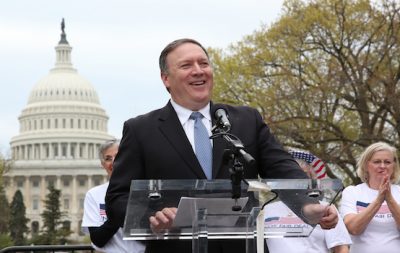Pompeo Lied to Congress About Yemen to Protect Arms Sales

Mike Pompeo’s certification earlier this month that the Saudi coalition was working to reduce harm to civilians in Yemen was an obvious sham. According to a new report in The Wall Street Journal, Pompeo made the decision to lie for the Saudis and Emiratis because he feared it would hurt arms sales:
Mr. Pompeo overruled concerns from most of the State Department specialists involved in the debate who were worried about the rising civilian death toll in Yemen. Those who objected included specialists in the region and in military affairs. He sided with his legislative affairs team after they argued that suspending support could undercut plans to sell more than 120,000 precision-guided missiles to Saudi Arabia and the United Arab Emirates, according to a classified State Department memo and people familiar with the debate.
Cutting off refueling to the coalition likely would make it extremely difficult to sell more weapons to the Saudis and Emiratis, but that is not a good reason to ignore evidence and expert advice and then lie to Congress. Opponents of the war have been trying to block arms sales to both countries for years, and this just gives them one more reason to keep trying. The U.S. should not be in the business of arming governments that we know will use them to commit war crimes, and that certainly applies to the Saudis and the UAE as long as the war on Yemen continues. The longer that the war drags on, and the more civilians that the coalition kills using U.S.-made weapons, the more politically toxic arms sales to Saudi Arabia and the UAE will become. In the end, Pompeo’s decision to flout the law and lie to Congress will just make opposition to future arms sales that much more intense.
To their credit, most State Department officials were telling Pompeo that he shouldn’t do what he ended up doing:
The experts argued that certification would “provide no incentive for Saudi leadership to take our diplomatic messaging seriously,” and “damage the Department’s credibility with Congress,” according to portions of the memo shared with The Wall Street Journal.
The department’s experts were right on both counts, but they may have underestimated how much damage Pompeo has done with Congress by making such a transparently dishonest certification that flies in the face of all the available evidence. Unfortunately, the department experts still favored continued military assistance for the war anyway:
They urged Mr. Pompeo to instead tell Congress that he couldn’t certify that the Gulf nations were doing enough to minimize civilian casualties, but that the U.S. would continue to provide military support to the coalition because it is in America’s national security interest.
Here the experts couldn’t be more wrong. No U.S. interests are being served by enabling coalition war crimes and the mass starvation of innocent people. Our security is not threatened by the coalition’s enemies in Yemen. The only people in the country that pose any threat to the U.S. are the Al Qaeda in the Arabian Peninsula (AQAP) members that the coalition has been buying off and recruiting. The coalition’s war is not making the U.S. any safer, and it is actively harming what few interests we do have in the area.
USAID stands out as the only one involved in the process that had the right answer:
The U.S. Agency for International Development went even further and argued that the U.S. should halt military aid because “USAID does not believe that continued refueling support will improve either country’s approach to civilian casualties or human protections.”
There was never any chance that Pompeo was going to pay attention to this advice. This report just underscores why it is critical for Congress to do what the administration never will. Congress needs to vote for an end U.S. involvement in the war and to block all arms sales in order to pressure the Saudi coalition to stop their military campaign.
*
Note to readers: please click the share buttons above. Forward this article to your email lists. Crosspost on your blog site, internet forums. etc.
Featured image is from Mark Taylor/Creative Commons.

